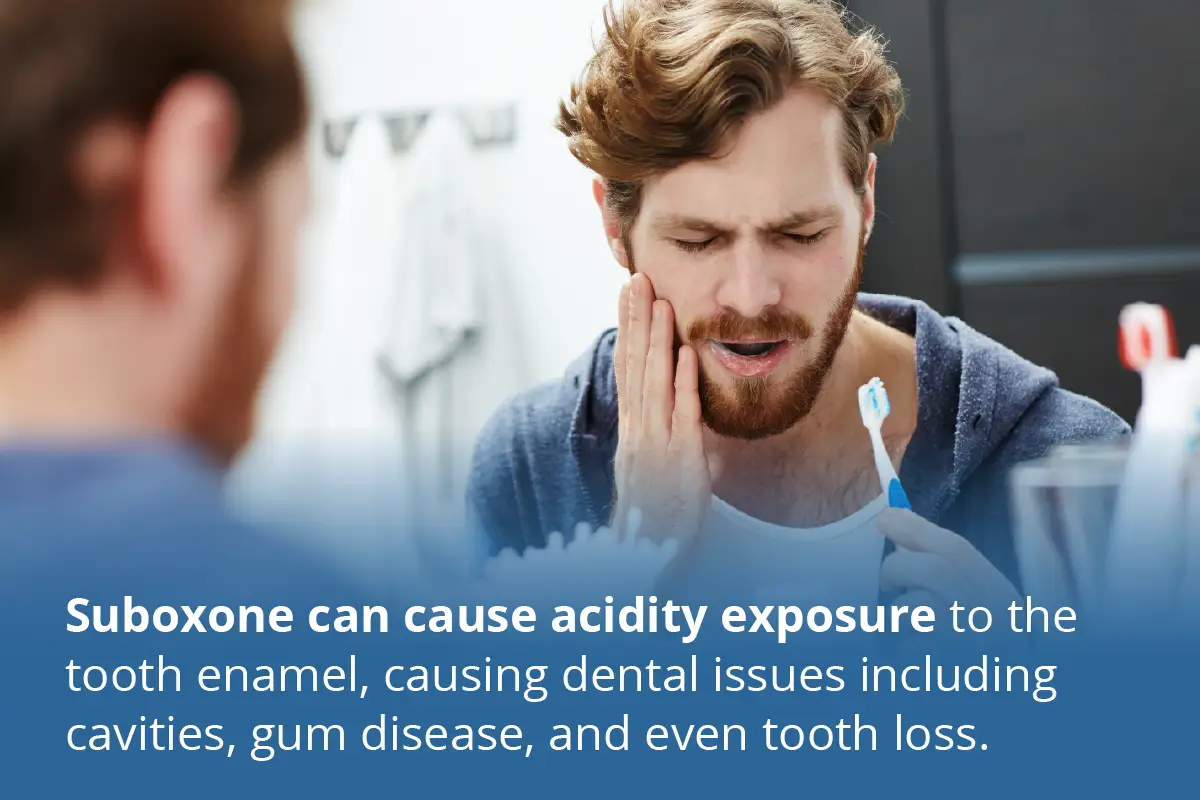Reducing Tooth Decay While Taking Suboxone
Other Categories

In 2022, the Food and Drug Administration (FDA) officially mandated that pharmaceutical companies warn patients and doctors about the risk of oral injuries that Suboxone may cause. Many patients find the benefits of Suboxone to outweigh potential risks, but there are ways to mitigate these risks by listening to your doctor and dentist.
Key Takeaways
Suboxone is typically used as a taper for individuals with an opioid use disorder (OUD). Here’s what you need to know about Suboxone and tooth decay:
- Suboxone side effects can cause serious dental injuries caused by the acidity.
- To mitigate or prevent dental risks when taking Suboxone, prioritize oral hygiene.
- To keep teeth from decay or other dental problems, reduce sugary food and beverage consumption and boost calcium and vitamin D diets to keep tooth enamel strong.
Suboxone
Suboxone is a medication-assisted treatment (MAT), mainly used as a taper when treating opioid addiction withdrawal symptoms. Suboxone is chemically made from two active ingredients: buprenorphine and Naloxone.
Buprenorphine is a partial opioid that activates the same brain receptors, just like opioids, but to a lesser degree. It minimizes withdrawal symptoms and cravings and prevents the high of opioid drugs such as heroin and fentanyl. On the other hand, Naloxone is an opioid reversal treatment for overdoses when opioids are abused.
Suboxone is typically administered as part of a comprehensive treatment plan combined with counseling and therapy at addiction treatment centers as a dissolvable film or a tablet. Although Suboxone has its pros in helping individuals taper off from opiates to be sober, there are serious risks and side effects that come along with the medication. Here is a list of common side effects that may occur when taking Suboxone.
- Nausea
- Headaches
- Sweating
- Constipation
- Sleep Disturbance
These side effects can be managed, and the companies that distribute the drug warn doctors and patients about the risks so they can make an informed decision.
Risk of Dental Injuries Caused by Suboxone
Studies have shown that Suboxone sublingual films, placed and dissolved under the tongue, have led to tooth decay and other dental problems. Due to the extended acidity exposure, the tooth enamel begins to weaken, causing dental issues, including cavities, gum disease, and even tooth loss. These problems are not only painful but require drastic dental procedures such as fillings, extractions, and even implants. Patients who are prescribed Suboxone are being advised about the risk of tooth decay by their doctor or by reading the label.
Potential dental problems from taking Suboxone include:
- Tooth decay
- Tooth loss and extractions
- Infections
- Cracked teeth
- Cavities
- Root canal
- Dental caries (loss of enamel, dentine, etc.)
- Crown or crown replacement
To mitigate or prevent these risks, patients can take extra care of their teeth by regularly brushing, flossing, and using fluoride toothpaste and mouthwash to strengthen tooth enamel. Additionally, individuals can make dietary adjustments by reducing sugary foods and beverage consumption and boosting calcium and vitamin D diets to maintain strong teeth.
Suboxone Study Results
A 2022 study confirmed Suboxone caused dental injuries. Researchers analyzed three groups of people who used different medications: sublingual buprenorphine/Naloxone, transdermal buprenorphine, and oral naltrexone.
Researchers found that the group using sublingual buprenorphine/naloxone had more damaging dental injuries compared to the other two groups, specifically, cavities and tooth loss. According to the study results, dental problems were 1.42 times higher compared to those using transdermal buprenorphine and 1.67 times higher compared to those using oral naltrexone.
The rates pertaining to tooth loss were also found to be significantly higher with sublingual buprenorphine/Naloxone at 8.2 per 1000 person-years, compared to 3.5 for transdermal buprenorphine and 3.8 for oral naltrexone.
So why does the sublingual buprenorphine/Naloxone seem to have an increased risk of severe damage? As mentioned previously, researchers concluded that the acidic nature of the dissolvable films seems to be weakening and damaging the tooth enamel. When the dissolvable films are administered, individuals are instructed to hold the film under their tongue for a few minutes, exposing their teeth to acid for extended periods, causing the tooth enamel to erode. When the tooth enamel erodes, the inner layer, dentin, becomes exposed and vulnerable to decay.
Food and Drug Administration New Guidelines
The FDA now requires pharmaceutical companies to warn patients and doctors about the risks and side effects of dental injuries to be added to the prescribing information. In addition, the FDA is also requiring the companies to add the information to the patient Medication Guide for all medications containing dissolvable buprenorphine.
Preventing Tooth Decay
Patients who are prescribed Suboxone should take extra care to practice good oral hygiene to prevent tooth decay. After Suboxone is dissolved, rinse your mouth with water and swallow. Wait at least one hour before brushing your teeth.
When brushing your teeth, be sure to brush for two minutes with fluoride toothpaste. Angle your bristles toward the gumline and make small circles with your toothbrush. Brush all sides of each tooth as well as other areas that may hold on to acidity, like your cheeks, tongue, and the roof of your mouth. Brush your teeth at least twice a day and floss after eating.
Suboxone may increase your risk of tooth decay, but so does the long-term use of opioids. For many people, the benefits of Suboxone outweigh the risks, which can be mitigated with help from your doctor or dentist.
Frequently Asked Questions
Navigating the journey to recovery can bring up many questions. Below are some of the most commonly asked questions about our services. If you need more information or have additional questions, we are only a phone call away.
How do I report side effects from Suboxone?
To help the FDA track health and safety concerns with medications, patients and healthcare professionals can report side effects involving Suboxone or other medicines to the FDA MedWatch program by going to the FDA website and selecting the “Contact FDA” box at the bottom of the page.
Does the Buprenorphine in Suboxone help treat opioid use disorder?
Yes, the Buprenorphine in Suboxone helps treat opioid use disorder. The medication reduces opioid withdrawal symptoms and alleviates the desire to use opioids without causing the cycles of highs and lows associated with opioid abuse. When taken properly, the medication can also decrease the high effect of other opioids, making the use of opioids less appealing. When combined with counseling and behavioral therapies, medication-assisted treatment (MAT) is an effective way to treat opioid use disorder and reduce the chances of opioid overdose.



Other Categories Alcohol Use Mental Health Drug Use Recovery Key Findings from the Study Only

Other Categories Alcohol Use Mental Health Drug Use Recovery Trends in Substance Treatment America’s substance

Other Categories Alcohol Use Mental Health Drug Use Recovery Ketamine therapy has become famous for

Other Categories Alcohol Use Mental Health Drug Use Recovery Cognitive Behavioral Therapy (CBT) and Dialectical

Other Categories Alcohol Use Mental Health Drug Use Recovery Mental health and substance abuse recovery
Have Questions? Let’s Talk!
Let’s talk about what’s going on — no judgement. (We’ve been there before ourselves). No one will know you inquired and there is no commitment to call.
24/7 Support
Need someone to talk to? We’re always here—day or night.
No Commitment
Ask questions, get guidance—no pressure, no obligation.
100% Private
Your story stays with us. Confidential support, always.
